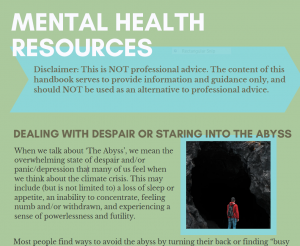Disclaimer: This is NOT professional advice. The content of this handbook serves to provide information and guidance only, and should NOT be used as an alternative to professional advice.
Dealing with despair or “staring into the abyss”

When we talk about ‘The Abyss’, we mean the overwhelming state of despair and/or panic/depression that many of us feel when we think about the climate crisis. This may include (but is not limited to) a loss of sleep or appetite, an inability to concentrate, feeling numb and/or withdrawn, and experiencing a sense of powerlessness and futility.
Most people find ways to avoid the abyss by turning their back or finding “busy work” that they can do right away. We as individuals often don’t have the tools for much else. Or if we did have the tools, we’ve forgotten how to use them. There’s not a language that we can share with other people, because we are scared that people might think we are strange if we talk about these feelings.
Dealing with despair and abyss-staring at a personal level is never about you as a person. It is always about you finding other people, ideally ones who are further along on the journey than you, because otherwise you’re just going to spiral each other into an even worse place. And it’s about understanding the seduction of urgent high-pitch action, even though yes, this is an emergency. You need to begin by understanding the psycho-dynamics going on within yourself and the psychosocial dynamics going on around you. That sounds complicated, but the one piece of good news we have is that this can be less difficult and complex than it sounds. Because, ultimately, you can find at least some of the answers you need through effective collective action.
Individual Morale Maintenance
There are many reasons why you may not maintain your own morale. Maybe you set high expectations, or get caught up in the excitement and liberation of starting something new, which soon fades away. Or you may feel that you have no right to feel upset or anxious because of your privileges; after all, you are lucky that you don’t have to worry about clean water, functioning public infrastructure or fighting for formal freedoms such as freedom of speech or assembly. You may bite down on those anxious feelings and remind yourself to “just toughen up.” These feelings are completely valid, but if we lack individual morale maintenance skills or the language to talk about it, then it’s likely that maintaining our individual morale over time becomes difficult. Moreover, with a lower individual morale, we are less useful to the group and we may also cause other people to lose their morale.
The solution to the problem of ignoring individual morale maintenance is to bring it out into the light, to have a buddy who you can talk things through with. This could be someone within or outside your climate activist group or broader friendship network. Talking to someone will also enable you to be conscious of the triggers that are currently setting you off- and remember, your triggers will most likely change over time. It’s so important to recognise and accept the validity of your feelings, because that’s the first step towards managing your emotions in a way that’s self-compassionate.
Disengaging from the news for a while is a popular way of sustaining personal morale – after all, the daily storm of incompetence, corruption and malice that passes as official news is likely to make you wonder “is the fight even worth it?”.
Another way of sustaining your morale is to actively seek out things that reinvigorate you when you feel like you are stuck in a slump. Running, gardening, writing fiction or poetry – anything that keeps you going when you feel drained. It is also important that you take a step back from high tempos of activity when you feel particularly down. Communication with your group is key here – let them know that you need a break and some time off.
You can download this section of the handbook as a pdf. You can also download the whole handbook as a single file (32Mb).
We intend to do another edition, so if you’ve found something wrong with this page, or you have comments, you can either leave a comment below, or else email us on studentclimatehandbook@climateemergencymanchester.net
If you like this handbook, and you’re reading this before November 10th 2020, and you live, work or study within Manchester City Council’s boundaries, please sign the petition for a seventh scrutiny committee, then share the petition with seven of your friends…
Navigation
Student Climate Handbook home page
